Devon Rexes and Cornish Rexes are two incredibly unique and unusual cat breeds that originated in the UK. Both are famous for their playful nature as well as their super-soft coats. However, despite the similarities, there are actually a few differences between them – particularly the shape of their faces and ears. So join us as we learn everything you need to know about Devon Rex vs Cornish Rex!
Comparing Cornish Rex vs Devon Rex
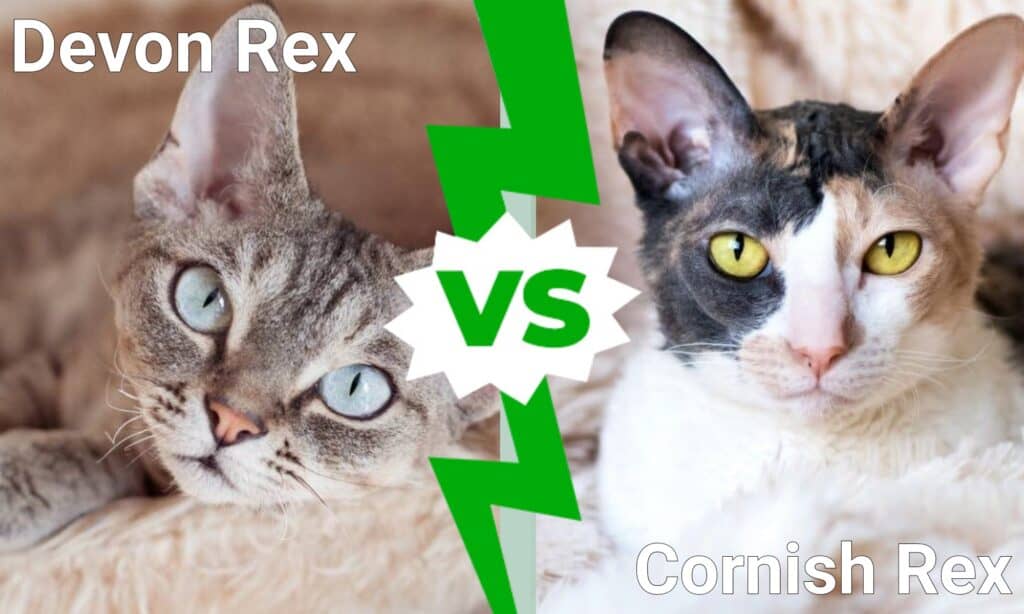
Cornish Rexes originated in Cornwall in the 1950s following the birth of an unusually curly-haired and long-legged kitten. The curly hair was found to result from a genetic mutation, with the curly-haired gene being recessive. After breeding the kitten back to his mother, the resulting kittens were bred to British Shorthairs and Siamese cats to create the breed we know today.
Devon Rexes originated in nearby Devon in the 1960s and were initially considered Cornish Rexes. However, although the curly coat in Devon Rexes is also caused by a genetic mutation and is a recessive gene, it is not the same gene that Cornish Rexes are. This means that although they might look similar, they are actually genetically very different.
| Cornish Rex | Devon Rex | |
|---|---|---|
| Origin | Cornwall, UK | Devon, UK |
| Size | 6 – 10 pounds 8 – 12 inches | 6 – 9 pounds 10 – 12 inches high |
| Coat Type | Short and wavy, only consists of an undercoat | Short, soft, and curly |
| Ears | Large, triangular | Large, slightly rounded, low-set |
| Head Shape | Egg-shaped | Wedge-shaped |
| Behavior | Playful, adventurous | Vocal, energetic |
| Lifespan | Approximately 15 years | 9 – 13 years |
The 4 Key Differences Between Devon Rexes and Cornish Rexes
Devon Rex vs Cornish Rex: Size
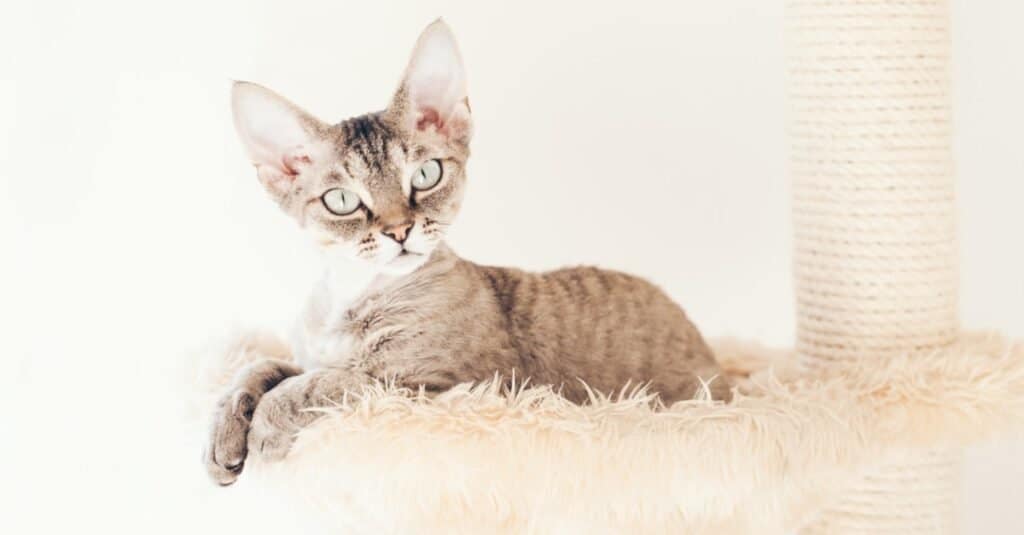
Devon Rexes are slightly taller than Cornish Rexes yet typically weigh less.
©iStock.com/insonnia
The first difference between these two unique cats is their size. Cornish Rexes can reach a slightly heavier weight than Devon Rexes – between 6 and 10 pounds, while Devon Rexes are 6 to 9 pounds. However, when it comes to their height, Devon Rexes are, on average, slightly taller. Devon Rexes stand between 10 and 12 inches high at the shoulder, while Cornish Rexes stand 8 to 12 inches high.
Devon Rex vs Cornish Rex: Coat
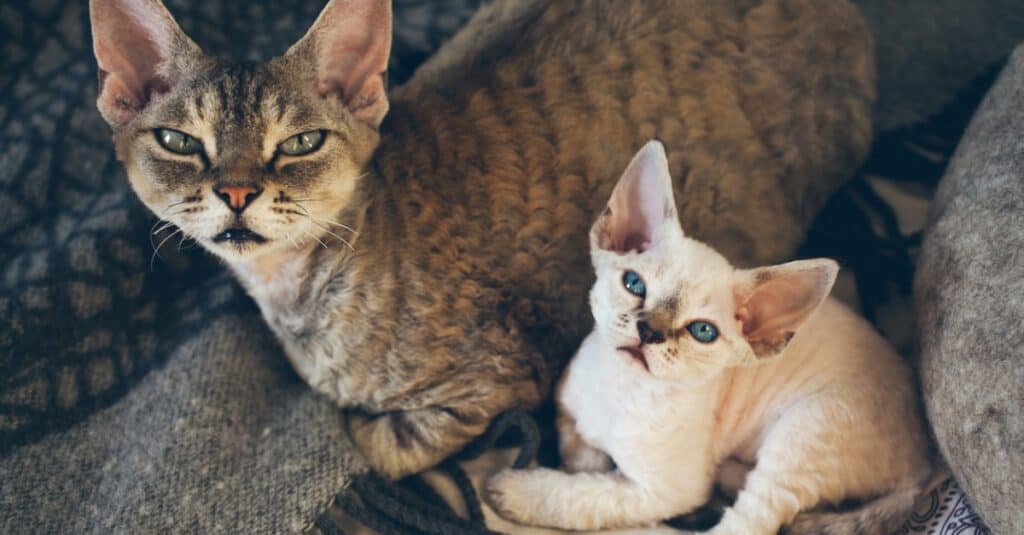
Devon Rex’s hair is also quite fragile, which sometimes causes them to be completely hairless in areas where they lick themselves often.
©iStock.com/insonnia
One thing that both cats are well known for is their unique coat. However, although both cats have short, curly hair, Cornish Rexes have a noticeably finer coat than Devon Rexes. The breed standard for Devon Rexes states that their hair should have a loose curl, giving the coat a wavy appearance. However, their hair is also quite fragile, which sometimes causes them to be completely hairless in areas where they lick themselves often. It also causes their whiskers to break off – leaving them much shorter than those of Cornish Rexes.
Although Cornish Rexes hair is also curly, it is incredibly fine as it lacks the outer guard hairs – meaning it only consists of the soft undercoat. It often looks softer and shorter than that of Devon Rexes. Additionally, Cornish Rexes often even have curly whiskers!
Devon Rex vs Cornish Rex: Appearance
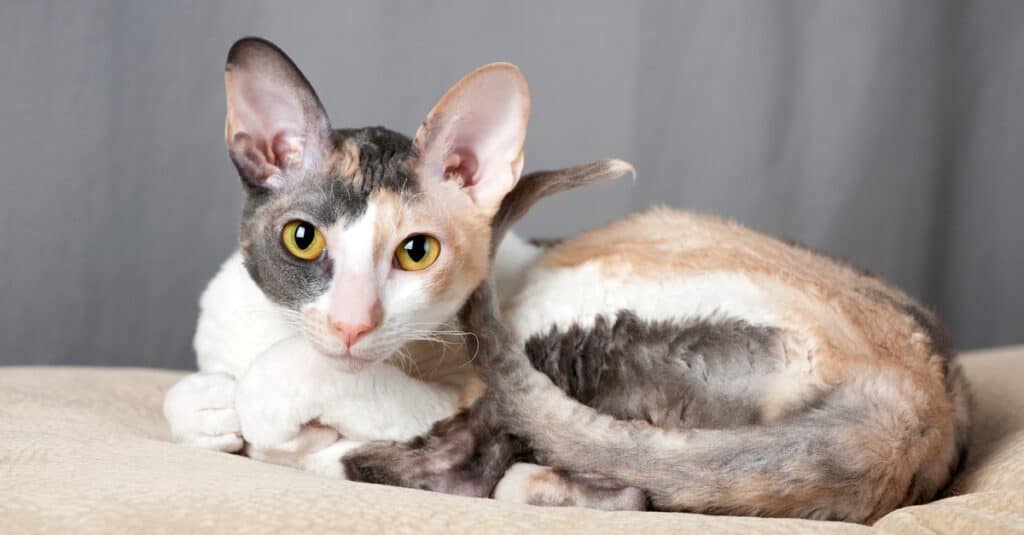
Cornish Rex cats are extremely affectionate and love to be around people — so much that they might demand attention and companionship.
©Marina Shanti/Shutterstock.com
Possibly the most distinctive difference between Devon and Cornish Rexes is still their appearance. Cornish Rexes have a distinctive egg-shaped head with high cheekbones, and their ears are large and triangular and typically described as “bat-ears.” Cornish Rexes also have a slim build, long neck, and long back legs.
However, Devon Rexes have a wedge-shaped head which leads to them being described as having an “elfin” appearance. Devon Rexes have large ears which are slightly rounded and set low on their heads. They also have shorter back legs and a more muscular body – particularly around the chest area.
Devon Rex vs Cornish Rex: Behavior
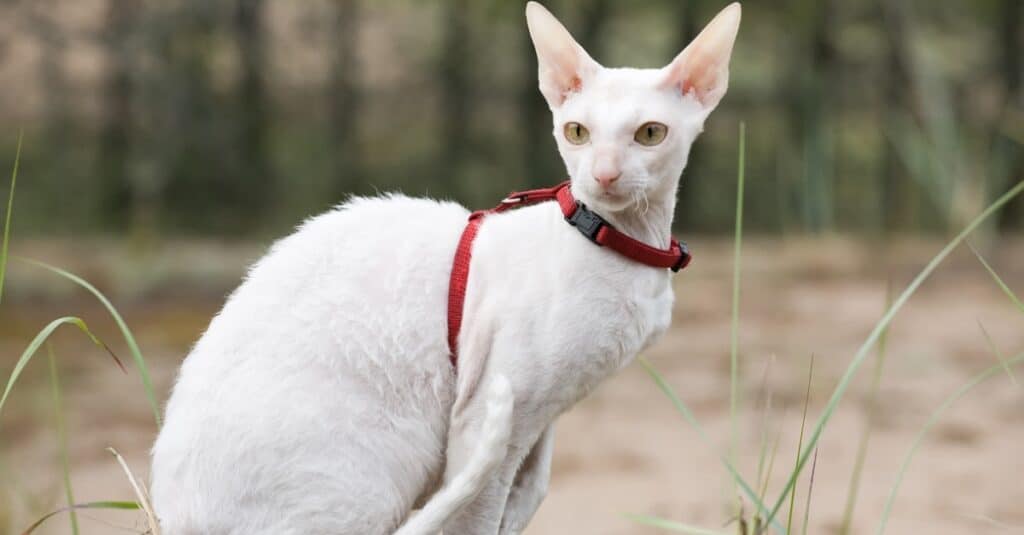
Cornish Rexes are incredibly active and will happily spend hours playing with toys.
©Oleg Kozlov/Shutterstock.com
Although both cats are incredibly good-natured and make excellent pets, a few slight differences in their personalities set them apart. Devon Rexes are typically known as class clowns as they are active and energetic. They are intelligent and love to play while being incredibly vocal to ensure they have your attention. One of their favorite games is to hide around corners while meowing until you go to look for them. They also thrive on praise and love nothing more than to sit contentedly purring in return for affection. However, they also like to sit in high places around the house and seek out the warmest spots. Comfort is definitely high on their agenda!
Cornish Rexes are also incredibly playful and intelligent. They are often described as similar to dogs in that they are easy to train and enjoy spending hours playing with and retrieving toys, and this is only one trait that makes them especially good around children. They are active and agile and love to climb – there is virtually no area that is safe from them as they have such an inquisitive nature!
The photo featured at the top of this post is © iStock.com/insonnia
FAQs (Frequently Asked Questions)
Are Devon Rexes and Cornish Rexes hypoallergenic?
No, although they are often immediately assumed to be hypoallergenic, Devon Rexes and Cornish Rexes are not actually hypoallergenic. Despite this, as their hair is so short they are actually less likely to trigger allergies than other types of cat.
Are Devon Rexes and Cornish Rexes good with other pets?
Yes, both breeds get along well with other pets – whether they are cats, dogs, or other small animals.
Thank you for reading! Have some feedback for us? Contact the AZ Animals editorial team.







